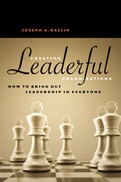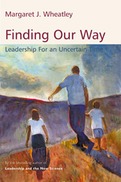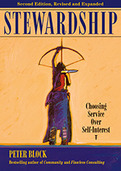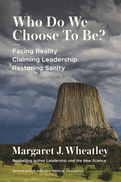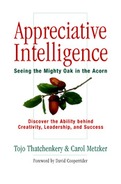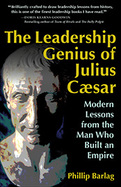Search Results: "servant leadership"
Results 55-60 of 550
The times demand a new style of leadership. Employees today are highly trained and independent-they can offer much more to an enterprise than simply their obedience. And with the relationship between worker and organization constantly changing, no one person will likely be able to lead alone. Creating Leaderful Organizations presents a paradigm of leadership tailored to our times, one that is based on mutual-rather than heroic-leadership.
It is not merely consultative, with leaders graciously allowing followers to participate in leadership, nor is it a stewardship approach in which the leader occasionally steps aside to allow others to take over temporarily. It is a revolutionary new approach that transforms leadership from an individual property to a collective responsibility. Raelin details how "leaderful" practice can accomplish the critical processes of leadership more effectively than any existing approach. And using actual examples from leading-edge organizations, he offers practical guidance for assessing your own and others' leaderful predisposition, preparing for leaderful practice, distributing leadership roles, and dealing with resistance to change.
It is not merely consultative, with leaders graciously allowing followers to participate in leadership, nor is it a stewardship approach in which the leader occasionally steps aside to allow others to take over temporarily. It is a revolutionary new approach that transforms leadership from an individual property to a collective responsibility. Raelin details how "leaderful" practice can accomplish the critical processes of leadership more effectively than any existing approach. And using actual examples from leading-edge organizations, he offers practical guidance for assessing your own and others' leaderful predisposition, preparing for leaderful practice, distributing leadership roles, and dealing with resistance to change.
- Outlines a revolutionary new approach to leadership that is better able to respond to organizational turbulence, meet customer expectations, maintain employee commitment, and unleash creativity
- Shows why leadership must be concurrent-with two or more people leading simultaneously-if organizations are to flourish
- Includes examples of this new approach in action from some of today's most progressive organizations -- the Peace Corps, Orpheus Chamber Orchestra, Virgin, Harley-Davidson, and The New Yorker.
Finding Our Way
2007
For years, Margaret Wheatley has written eloquently about humanizing our organizations and helping people to work together more effectively and compassionately. She has shown how breakthroughs in chaos theory and quantum physics can enable organizations to function more like responsive, self-organizing living systems, rather than cold mechanisms of control. And she has gradually expanded these ideas into the wider arena of human society.
In short, Margaret Wheatley is one of the most innovative and influential organizational thinkers of our time, and Finding Our Way brings together her shorter writings for the first time, touching on all the topics she has addressed throughout her career, showing how she has applied the ideas in her books s in many different situations. “The pieces presented here”, she writes, “represent ten years of work, of how I took the ideas in my books and applied them in practice in many different situations. However, this is not a collection of articles. I updated, revised, or substantially added to the original content of each one. In this way, everything written here represents my current views on the subjects I write about.”
Provocative, challenging, at times poetic, and often deeply moving, Finding Our Way sums up Wheatley's thinking on a diverse scope of topics from leadership and management to education and raising children in turbulent times; from societal commentary to specific organizational techniques and more.
In short, Margaret Wheatley is one of the most innovative and influential organizational thinkers of our time, and Finding Our Way brings together her shorter writings for the first time, touching on all the topics she has addressed throughout her career, showing how she has applied the ideas in her books s in many different situations. “The pieces presented here”, she writes, “represent ten years of work, of how I took the ideas in my books and applied them in practice in many different situations. However, this is not a collection of articles. I updated, revised, or substantially added to the original content of each one. In this way, everything written here represents my current views on the subjects I write about.”
Provocative, challenging, at times poetic, and often deeply moving, Finding Our Way sums up Wheatley's thinking on a diverse scope of topics from leadership and management to education and raising children in turbulent times; from societal commentary to specific organizational techniques and more.
- By the author of the bestsellers Leadership and the New Science (over 300,000 copies sold) and Turning to One Another, and the coauthor of A Simpler Way
- Wheatley is one of the most innovative and influential organizational thinkers of our time, and this is the first collection of her articles and essays--completely revised and rewritten for this volume
- Covers a wide and diverse scope of topics--leadership, management, education, parenting, social commentary, creativity, spirituality, and more
Stewardship
2013
One of the most provocative and revolutionary books written on leadership, business, and organizational design, Stewardship remains just as relevant, even twenty years later, to transforming our organizations for the common good of the wider community.
We still face the challenge of fostering ownership and accountability throughout our organizations. Despite all the evidence calling for profound change, most organizations still rely on patriarchy and control as their core form of governance. The result is that they stifle initiative and spirit and alienate people from the work they do. This in the face of an increasing need to find ways to be responsive to customers and the wider community.
Peter Block insists that what is required is a dramatic shift in how we distribute power, privilege, and the control of money. “Stewardship,” he writes, “means giving people at the bottom and the boundaries of the organization choice over how to serve a customer, a citizen, a community. It is the willingness to be accountable for the well-being of the larger organization by operating in service, rather than in control, of those around us.”
Block has revised and updated the book throughout, including a new introduction addressing what has changed—and what hasn't—in the twenty years since the book was published and a new chapter on applying stewardship to the common good of the wider community. He covers both the theory of stewardship (in particular how it ameliorates the shortcomings of traditional leadership) and the practice (how it transforms every function and department for the better). And he offers tactical advice as well on gearing up to implement these reforms.
We still face the challenge of fostering ownership and accountability throughout our organizations. Despite all the evidence calling for profound change, most organizations still rely on patriarchy and control as their core form of governance. The result is that they stifle initiative and spirit and alienate people from the work they do. This in the face of an increasing need to find ways to be responsive to customers and the wider community.
Peter Block insists that what is required is a dramatic shift in how we distribute power, privilege, and the control of money. “Stewardship,” he writes, “means giving people at the bottom and the boundaries of the organization choice over how to serve a customer, a citizen, a community. It is the willingness to be accountable for the well-being of the larger organization by operating in service, rather than in control, of those around us.”
Block has revised and updated the book throughout, including a new introduction addressing what has changed—and what hasn't—in the twenty years since the book was published and a new chapter on applying stewardship to the common good of the wider community. He covers both the theory of stewardship (in particular how it ameliorates the shortcomings of traditional leadership) and the practice (how it transforms every function and department for the better). And he offers tactical advice as well on gearing up to implement these reforms.
In a world we cannot recognize, how do we find a way forward? In this world we do not understand, how do we know what to do? When so little is comprehensible, what is meaningful work? What is genuine contribution?
Bestselling author Margaret Wheatley has summoned us to be courageous leaders who strengthen community and rely on fully engaged people since her 1992 classic book, Leadership and the New Science, and eight subsequent books. In response to how quickly society is changing and the exponential increase in leadership challenges, this second edition of her latest bestseller is 80% new material.
How do we see clearly so that we can act wisely? Wheatley brings present reality into clear and troubling focus using multiple lenses of Western and Indigenous sciences, and the historic patterns of collapse in complex civilizations. With gentle but insistent guidance to face reality, she offers us the path and practices to be sane leaders who know how to evoke people's inherent generosity, creativity, and kindness.
Skillfully weaving science, history, exemplars, poetry, and quotes with stories and practices, Wheatley asks us to be Warriors for the Human Spirit, leaders and citizens who stay engaged, choose service over self, stand steadfast in the midst of crises, and offer our reliable presence of compassion and insight no matter what.
Bestselling author Margaret Wheatley has summoned us to be courageous leaders who strengthen community and rely on fully engaged people since her 1992 classic book, Leadership and the New Science, and eight subsequent books. In response to how quickly society is changing and the exponential increase in leadership challenges, this second edition of her latest bestseller is 80% new material.
How do we see clearly so that we can act wisely? Wheatley brings present reality into clear and troubling focus using multiple lenses of Western and Indigenous sciences, and the historic patterns of collapse in complex civilizations. With gentle but insistent guidance to face reality, she offers us the path and practices to be sane leaders who know how to evoke people's inherent generosity, creativity, and kindness.
Skillfully weaving science, history, exemplars, poetry, and quotes with stories and practices, Wheatley asks us to be Warriors for the Human Spirit, leaders and citizens who stay engaged, choose service over self, stand steadfast in the midst of crises, and offer our reliable presence of compassion and insight no matter what.
Appreciative Intelligence provides a new answer to what enables successful people to dream up their extraordinary and innovative ideas; why employees, partners, colleagues, investors, and other stakeholders join them on the path to their goals, and how they achieve these goals despite obstacles and challenges. It is not simple optimism. People with appreciative intelligence are realistic and action oriented--they have the ability not just to identify positive potential, but to devise a course of action to take advantage of it.
Drawing on their own original research and recent discoveries in psychology and cognitive neuroscience, Thatchenkery and Metzker outline the evidence for appreciative intelligence, detail its specific characteristics, and show how you can develop this skill and use it in your own life and work. They show how the most successful leaders are able to spread appreciative intelligence throughout an organization, and they offer tools and exercises you can use to increase your own level of appreciative intelligence and so become more creative, resilient, successful, and personally fulfilled.Appreciative Intelligence provides a new answer to what enables successful people to dream up their extraordinary and innovative ideas; why employees, partners, colleagues, investors, and other stakeholders join them on the path to their goals, and how they achieve these goals despite obstacles and challenges. It is not simple optimism. People with appreciative intelligence are realistic and action oriented--they have the ability not just to identify positive potential, but to devise a course of action to take advantage of it.
Drawing on their own original research and recent discoveries in psychology and cognitive neuroscience, Thatchenkery and Metzker outline the evidence for appreciative intelligence, detail its specific characteristics, and show how you can develop this skill and use it in your own life and work. They show how the most successful leaders are able to spread appreciative intelligence throughout an organization, and they offer tools and exercises you can use to increase your own level of appreciative intelligence and so become more creative, resilient, successful, and personally fulfilled.
- Draws on the authors' original research and the latest discoveries in psychology and cognitive neuroscience to identify a previously unknown intelligence shared by successful leaders: appreciative intelligence
- Uses real-world examples to show appreciative intelligence in action
- Includes tools and exercises for developing appreciative intelligence in yourself and your organization
The Leadership Genius of Julius Caesar
Modern Lessons from the Man Who Built an Empire
“Brilliantly crafted to draw leadership lessons from history, this is one of the finest leadership books I have read.”
—Doris Kearns Goodwin, bestselling author of Team of Rivals and The Bully Pulpit
Leaders are always trying to get better, which is why there is an enormous and growing collection of literature offering the latest leadership paradigm or process. But sometimes the best way to move forward is to look back. Philip Barlag shows us that Julius Caesar is one of the most compelling leaders of the past to study—a man whose approach was surprisingly modern and extraordinarily effective.
History is littered with leaders hopelessly out of touch with their people and ruthlessly pursuing their own ambitions or hedonistic whims. But Caesar, who rose from impoverished beginnings, proved by his words and deeds that he never saw himself as being above the average Roman citizen. And he had an amazing ability to generate loyalty, to turn enemies into allies and allies into devoted followers.
Barlag uses dramatic and colorful incidents from Caesar's career—being held hostage by pirates, charging headlong alone into enemy lines, pardoning people he knew wanted him dead—to illustrate what Caesar can teach leaders today. Central to Barlag's argument is the distinction between force and power. Caesar avoided using brute force on his followers, understanding that fear never generates genuine loyalty. He exercised a power deeply rooted in his demonstrated personal integrity and his intuitive understanding of people's deepest needs and motivations. His supporters followed him because they wanted to, not because they were compelled to. Over 2,000 years after Caesar's death, this is still the kind of loyalty every leader wants to inspire. Barlag shows how anyone can learn to lead like Caesar.
Modern Lessons from the Man Who Built an Empire
“Brilliantly crafted to draw leadership lessons from history, this is one of the finest leadership books I have read.”
—Doris Kearns Goodwin, bestselling author of Team of Rivals and The Bully Pulpit
Leaders are always trying to get better, which is why there is an enormous and growing collection of literature offering the latest leadership paradigm or process. But sometimes the best way to move forward is to look back. Philip Barlag shows us that Julius Caesar is one of the most compelling leaders of the past to study—a man whose approach was surprisingly modern and extraordinarily effective.
History is littered with leaders hopelessly out of touch with their people and ruthlessly pursuing their own ambitions or hedonistic whims. But Caesar, who rose from impoverished beginnings, proved by his words and deeds that he never saw himself as being above the average Roman citizen. And he had an amazing ability to generate loyalty, to turn enemies into allies and allies into devoted followers.
Barlag uses dramatic and colorful incidents from Caesar's career—being held hostage by pirates, charging headlong alone into enemy lines, pardoning people he knew wanted him dead—to illustrate what Caesar can teach leaders today. Central to Barlag's argument is the distinction between force and power. Caesar avoided using brute force on his followers, understanding that fear never generates genuine loyalty. He exercised a power deeply rooted in his demonstrated personal integrity and his intuitive understanding of people's deepest needs and motivations. His supporters followed him because they wanted to, not because they were compelled to. Over 2,000 years after Caesar's death, this is still the kind of loyalty every leader wants to inspire. Barlag shows how anyone can learn to lead like Caesar.


